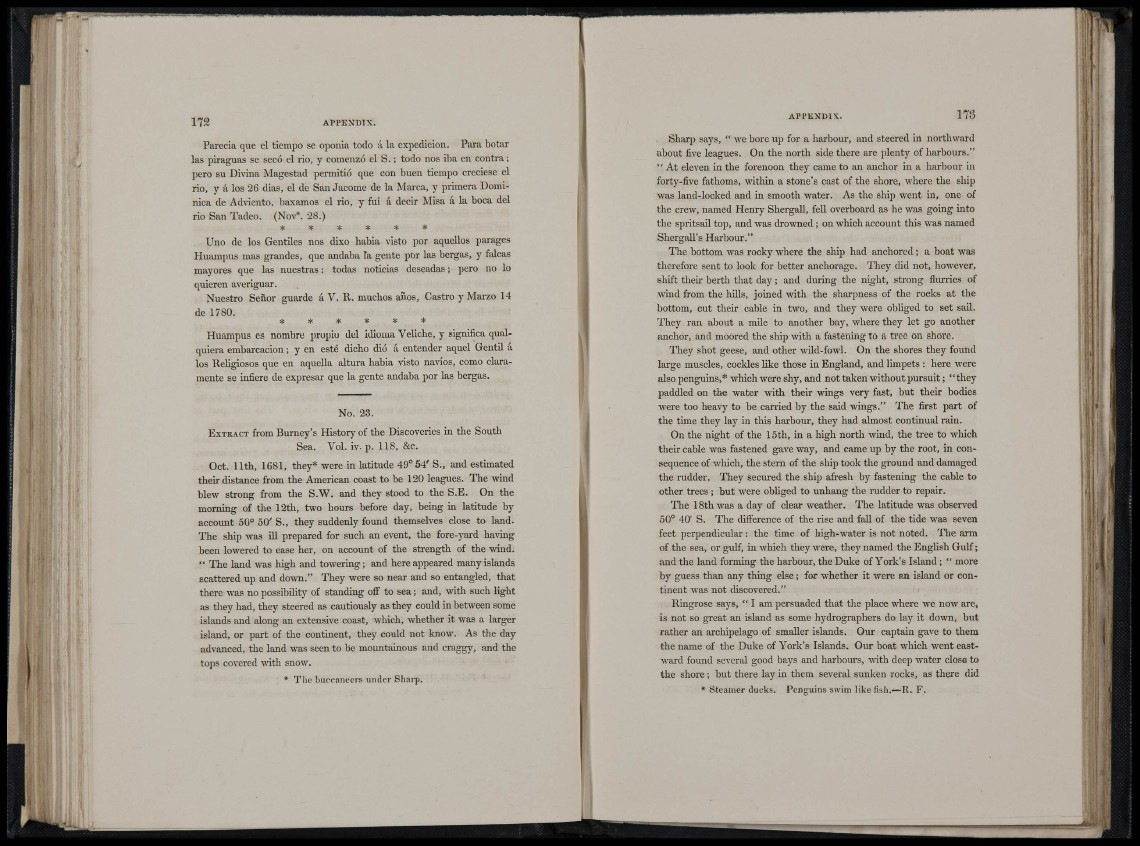
172 APPENDIX.
Parecía que el tiempo se oponía todo á la expedición. Para botar
las piraguas se seco el rio, y comenzó el S. ; todo nos iba en contra ;
pero su Divina Magestad permitió que con buen tiempo creciese el
rio, y á los 26 dias, el de San Jacome de la Marca, y primera Dominica
de Ad\áento, baxamos el rio, y fui á decir Misa á la boca del
rio San Tadeo. (Nov'. 28.)
* * * * * *
Uno de los Gentiles nos dixo liabia visto por aquellos parages
Huampus mas grandes, que andaba la gente por las bergas, y falcas
mayores que las nuestras : todas noticias deseadas ; pero no lo
quieren averiguar.
Nuestro Señor guarde á V. R. muchos años, Castro y Marzo 14
de 1780.
* * * * * *
Huampus es nombre propio del idioma Veliche, y significa qualquiera
embarcación ; y en esté dicho dió á entender aquel Gentil á
los Religiosos que en aquella altura habia visto navios, como claramente
se infiere de expresar que la gente andaba por las bergas.
No. 23.
EXTRACT from Barney's History of the Discoveries in the South
Sea. Vol. iv. p. 118, &c.
Oct. n th, 1681, they* were in latitude 49° 54' S., and estimated
their distance from the American coast to be 120 leagues. The wind
blew strong from the S.W. and they stood to the S.E. On the
morning of the 12th, two hours before day, being in latitude by
account 50° oC S., they suddenly found themselves close to land.
The ship was ill prepared for such an event, the fore-yard having
been lowered to ease her, on account of the strength of the wind.
The land was high and towering; and here appeared many islands
scattered up and down." They were so near and so entangled, that
there was no possibility of standing oif to sea; and, with such light
as they had, they steered as cautiously as they could in between some
islands and along an extensive coast, which, whether it was a larger
island, or part of the continent, they could not know. As the day
advanced, the land was seen to be mountainous and craggy, and the
tops covered mt h snow.
* Tlio buccaneer.s under Sharp.
APPENDIX. 173
Sharjj says, " we bore up for a harbour, and steered in northward
about five leagues. On the north side there are plenty of harbours."
" At eleven in the forenoon they came to an anchor in a harbour in
forty-five fathoms, within a stone's cast of the shore, where the ship
was land-locked and in smooth water. As the ship went in, one of
the crew, named Henry Shergall, fell overboard as he was going into
the spritsail top, and was drowned; on which account this was named
Shergall's Harbour."
The bottom was rocky where the ship had anchored; a boat was
therefore sent to look for better anchorage. They did not, however,
shift their berth that day; and during the night, strong flurries of
\™d from the hdls, joined with the sharpness of the rocks at the
bottom, cut their cable in two, and they were obliged to set sail.
They ran about a mile to another bay, where tbey let go another
anchor, and moored the ship with a fastening to a tree on shore.
They shot geese, and other wild-fowl. On the shores they found
large muscles, cockles hke those in England, and limpets : here were
also penguins,* which were shy, and not taken without pursuit; " they
paddled on the water with their wings very fast, but their bodies
were too heavy to be carried by the said wings." The first part of
the time they lay in this harbour, they had almost continual rain.
On the night of the 15th, in a high north wind, the tree to which
their cable was fastened gave way, and came up by the root, in consequence
of which, the stem of the ship took the ground and damaged
the rudder. They secured the ship afresh by fastening the cable to
other trees; but were obliged to unhang the rudder to repair.
The 18th was a day of clear weather. The latitude was observed
50° 40' S. The difference of the rise and fall of the tide was seven
feet perpendicular: the time of high-water is not noted, llie arm
of the sea, or gulf, in which they were, they named the Enghsh Gulf;
and the land forming the harbour, the Duke of York's Island; " more
i)y guess than any thing else; for whether it were an island or continent
was not discovered."
Ringrose says, " I am persuaded that the place whei'e we now are,
is not so great an island as some hydrographers do lay it down, but
rather an archipelago of smaller islands. Our captain gave to them
the name of the Duke of York's Islands. Our boat which went eastward
foxmd several good bays and harbours, with deep water close to
the shore; but there lay in them several sunken rocks, as there did
* Steamer ducks. Penguins svrim like fisli.—R. F.
.1
11
«Il I. i tu 1